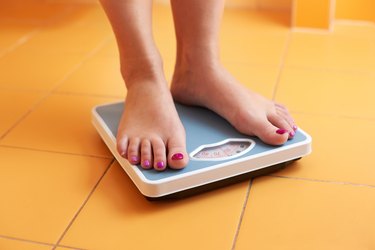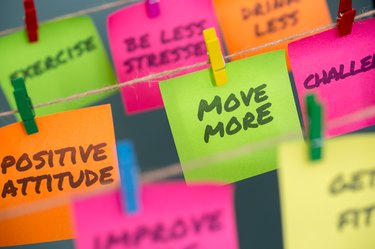
Planning to lose 60 pounds in general is a little intimidating, but setting a six-month deadline to do it is a downright daunting endeavor. For safe, sustainable weight loss, experts suggest aiming for 1-2 pounds a week. Do the math, and you can see that losing 60 pounds in six months may be an overly ambitious goal for many.
Six months, though, is plenty of time to make some big lifestyle changes, and make progress toward losing the weight. Here, you can get a refresher on weight-loss basics and then get the best tips on how to safely shed those pounds within a realistic timeframe.
Video of the Day
Video of the Day
How Weight Loss Works
Weight loss is complicated — it depends on many factors, including your genes, stress management tactics and medical conditions, according to the National Institute of Diabetes and Digestive and Kidney Diseases (NIDDK).
Weight loss depends on an energy deficit, with calories being one way to measure energy. While the size of the energy deficit will dictate how much and how fast you lose, it's widely recommended to aim for gradual, steady weight loss.
Since 3,500 calories equals around one pound of fat, you need to burn that many calories to lose one pound, according to the Mayo Clinic. Ideally, that means if you cut approximately 500 to 1,000 calories from your daily diet (or combine diet and exercise to cut the calories), you can safely lose 1 to 2 pounds a week.
If you're consistently losing around 2 pounds per week, you can drop around 50 pounds in 6 months, and lose 60 pounds in a little over 7 months. Remember, everyone's body, and weight-loss progress, is different — you may lose faster, you may lose slower.
Now that you got through weight loss 101, here are the best tips to set you up for long-term weight-loss success.
1. Calculate Daily Calories
Use an online calculator or meet with a dietitian to determine how many calories you need daily in order to maintain your weight.
Once you get this number, subtract 500 to 1,000 calories from it, according to the Mayo Clinic. The resulting number is your new daily calorie target in order to lose weight and fat. Of course, if you're consistently exercising, you can, say, cut 250 calories from your food intake as long as you burn 250 calories exercising.
Warning
It’s highly recommended that your calorie intake not fall below 1,200 a day for people assigned female at birth (AFAB) or 1,500 a day in people assigned male at birth (AMAB), unless you’re under the guidance of a medical professional, per Harvard Health Publishing.
2. Improve Daily Nutrition
Diving headfirst into the deep-end of healthy eating can be pretty overwhelming, but it doesn't have to be a solo project. Elena A. Ivanina, DO, MPH, assistant program director at Lenox Hill Hospital in New York City, believes that weight loss is a very individual journey and that every person needs a personalized approach — one that should be monitored by a healthcare professional.
"You have to consider the other health goals that exist to come up with the most holistic approach to weight loss," Dr. Ivanina says. For instance, intermittent fasting may be a good option for people looking to reduce their cholesterol and improve their blood pressure, she notes. "If someone had fatty liver, then a ketogenic diet could be a good fit as six days of a ketogenic diet have been shown to markedly decrease liver fat content and hepatic insulin resistance," Dr. Ivanina says.
With that in mind, a balanced eating plan should include a variety of foods from all the food groups, but little to no refined carbs, trans fat, added sugars and processed food, according to the Centers for Disease Control and Prevention (CDC). Choose high-quality, healthful foods such as:
- Lean meats and fish
- Fruits and veggies
- Whole grains
- Healthy fats
And know that eating for weight loss doesn't have to feel limiting. Enjoy your nutritious food with delicious recipes and pairings, but also treat yourself every now and then, because a too-restrictive diet just isn't realistic for long-term weight loss and maintenance.
3. Track Food and Calories
Tracking your food using an app or journal can become a healthy habit of mindful eating, according to the American Society of Nutrition. Not only does it help you keep track of what you ate that day and each food's calories, but it could also help you see what you're not getting enough of, how to adjust your eating schedule and your emotions at that time — to see if you're eating out of stress, boredom, etc.
"Tracking or food journaling gives people a lot of insight into their diet that they may not have realized otherwise," Dr. Ivanina says.
Studies show that tracking what you eat can further weight-loss goals. For instance, a February 2019 study in Obesity found over a six-month period, people who tracked what they ate most often lost more weight than people who tracked less.
"I believe that successful weight loss involves being more in tune with your body and habits, and food journaling provides this type of insight," Dr. Ivanina says.
Take advantage of a calorie-counter app on your phone to monitor your calories and food, water and macronutrients, or just grab a notebook. Tracking just takes two things from the user for it to be useful, according to Harvard Health Publishing — motivation to make a change and using the app enough to produce the desired outcome.
4. Get Consistent, Proper Exercise
The benefits from consistent exercise should come as no surprise. Working out not only helps manage weight and build muscle, but also combats health conditions, improves mood, boosts energy and promotes better sleep (see tip number 7 on this list!), according to the Mayo Clinic.
Adults should be getting at least 150 to 300 minutes of moderate-intensity or 75 to 150 minutes of vigorous-intensity cardio throughout the week, according the Physical Activity Guidelines for Americans. For weight loss, aiming for closer to 300 minutes of exercise a week might be beneficial, per a study published in the November 2020 issue of Medicine & Science in Sports & Exercise.
Any form of exercise is meaningful: walking, jogging, hiking, swimming, biking, dancing — do what you love! Some suggested workouts include:
HIIT
High intensity interval training (HIIT) is a fantastic way to burn the most calories in the least amount of time. This type of workout involves repeated bursts of high intensity activity followed by lower intensity recovery times, according to the American College of Sports Medicine, such as alternating sprinting for 30 seconds with walking for 15 seconds.
A June 2017 article in Obesity Reviews found that short-term HIIT workouts can lead to a fair amount of body composition improvements without even losing weight, despite minimal time commitment.
Strength Training
Believe it or not, strength training should be just as important as cardio because it builds muscle mass, which replaces fat and increases metabolic rate, according to American Council on Exercise.
A study published in April 2014 in Journal of Sports Sciences found that a combination of cardio and strength training had better results, showing decreased body fat and increased lean muscle than with just cardio alone. You could also potentially raise your resting metabolic rate by 7 percent doing 10 weeks of resistance training, per an article published in the July/August 2012 issue of Current Sports Medicine Reports.
5. Drink Enough Water
The general guideline is to drink 4- to 6-cups of water a day, per Harvard Health Publishing. But people who seek to lose weight might benefit from drinking even more. For one thing, it's calorie-free, and performs a wide variety of tasks — from carrying nutrients to your cells to normalizing blood pressure — that help keep your body functioning normally.
Plus, there is a significant link between obesity and inadequate hydration, per a study published in July 2016 in The Annals of Family Medicine. The study suggests that people with overweight may be eating when they are actually thirsty and/or aren't drinking as much as their bodies require.
Bottom line: Keep your glass of water — or reusable water bottle — readily available to help drink water throughout the day.
6. Cut Down on Alcohol
Having a glass of wine or cocktail here and there is totally fine! Just be aware that alcohol can slow down your weight-loss progress. The empty calories in a cocktail may be taking the place of a healthy snack that would fuel your body.
"Cutting out alcohol is a great way to cut calories and improve gut health," Dr. Ivanina says. "A study found that 19 percent of men consume over 300 calories a day and 12 percent of women consume over 150 calories a day from alcohol. Seems like an obvious choice!"
7. Hit the Sack (Earlier)
Most people don't get enough shut-eye, according to CDC. It's recommended that adults ages 18 to 60 years get 7 or more hours of quality sleep each night; adults ages 61 to 64 years get 7 to 9 hours; and ages 65 years and older should get 7 to 8 hours.
Sleep deprivation is found to increase belly fat accumulation, according to the National Sleep Foundation. Researchers found that people sleeping less than 5 hours at night gained more belly fat over several years, compared to those who slept more than 6 hours. And a review published July 2014 in Annals of Medicine links sleep deficits to extra snacking, decreased energy expenditure and changes in appetite-regulating hormone levels.
If you're tired all the time, it'll be that much harder to get in a great workout or prepare a nutritious meal.
8. Allow for Setbacks or Plateaus
It's normal for setbacks and plateaus to occur. You may go over your daily calorie target during a vacation or during a holiday season, and gain a few pounds — that's OK. Reset and refocus, and those pounds will come back off.
If you lose a significant amount of weight and eventually hit a plateau, you may need a lower daily calorie target as well as a new, longer, more advanced workout routine, according to the Mayo Clinic.
Figure Out Maintenance
Now that you're on your way to lose the weight you want in a realistic, healthy way, there's one last thing to do: Maintain it.
After losing the weight you wanted to lose, whether it be in 6 weeks or 6 months, John Hopkins Medicine suggests a gradual 200-calorie addition to your diet of healthy, balanced foods. If the scale continues to go down, additional calories should be incorporated into your diet until the right number of calories is determined to maintain your new weight.
Dr. Ivanina says that studies have shown that the best strategy for weight maintenance is exercise.
"Ideally, the goal would be to burn 1500 to 2000 calories per week with exercise to maintain weight loss, and at least 40 minutes of moderate to vigorous physical activity 3 to 4 times per week. Fad diets are never going to last, but intuitive individualized attainable eating habits and choices will —and will help ensure long-lasting success," Dr. Ivanina says.
To maintain your weight, you'll want to continue to choose healthy food, stay active with activities you enjoy, stay hydrated and get enough rest. And of course, if you need extra support, get the help of peer/support groups or a medical professional.
- Mayo Clinic: "Counting Calories: Get Back to Weight-Loss Basics"
- Harvard Health Publishing: "Calorie Counting Made Easy"
- Elena A. Ivanina, DO, MPH
- Centers for Disease Control and Prevention (CDC)
- American Society of Nutrition: "The Benefits of Food Journaling"
- Harvard Health Publishing: "Can an App Help You Lose Weight?
- Mayo Clinic: "Exercise: 7 Benefits of Regular Physical Activity"
- Physical Activity Guidelines for Americans: "Active Adults"
- American College of Sports Medicine: "High Intensity Interval Training"
- Obesity Reviews: "The Effects of High-Intensity Interval Training Vs. Moderate-Intensity Continuous Training on Body Composition in Overweight and Obese Adults: A Systematic Review and Meta-Analysis"
- American Council on Exercise: "Trimming Off the Fat"
- Journal of Sports Sciences: "Aerobic Plus Resistance Training Was More Effective in Improving the Visceral Adiposity, Metabolic Profile and Inflammatory Markers Than Aerobic Training in Obese Adolescents"
- Current Sports Medicine Reports: "Resistance Training is Medicine Effects of Strength Training on Health"
- Harvard Health Publishing: "How Much Water Should You Drink?"
- The Annals of Family Medicine: "Inadequate Hydration, BMI, and Obesity Among US Adults: NHANES 2009–2012"
- Centers for Disease Control and Prevention: "Sleep and Sleep Disorders"
- National Sleep Foundation: " Diet and Exercise and Sleep"
- Annals of Medicine: "Sleep Debt and Obesity"
- Mayo Clinic: "Getting Past a Weight-Loss Plateau"
- John Hopkins Medicine: "Maintaining Weight Loss"
- Obesity: "Log Often, Lose More: Electronic Dietary Self-Monitoring for Weight Loss"
- CDC: "Calories Consumed From Alcoholic Beverages by U.S. Adults, 2007–2010"
- National Institutes of Diabetes and Digestive and Kidney Diseases: "Factors Affecting Weight & Health"
- Medicine & Science in Sports & Exercise: "Exercise for Weight Loss: Further Evaluating Energy Compensation with Exercise"








